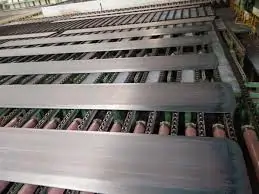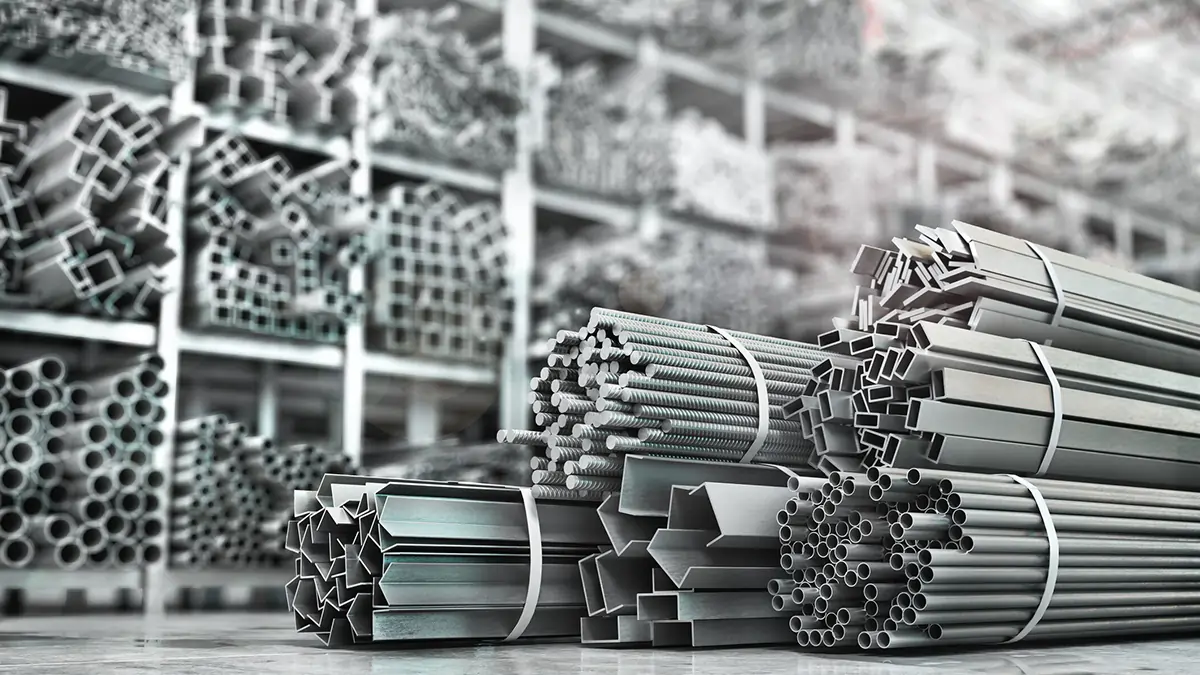Hot-rolled coils (HRC) are a widely used steel product formed in hot-rolling mills. Shaped like coiled sheets or strips, these products serve as a foundation for numerous industrial applications. They are essential in construction, machinery, automotive manufacturing, and the production of general-purpose, construction, oil and gas, and specialized pipes. Additionally, they act as a primary input for manufacturing cold-rolled steel products.
Applications of Hot-Rolled Steel Coils
- Construction and Infrastructure
Hot-rolled steel coils are extensively used in steel building construction, facade cladding, and pipe manufacturing. Typical applications include:
- Industrial and civil structural frames
- Utility enclosures for cables and channels
- Main pipelines, water systems, bridges, and trestles
- Ventilation, sewage, and flue duct systems
- Poles, road barriers, drainage elements, and lighting supports
- Playground structures, fencing, and partitions
The primary requirements in these sectors include high weldability, excellent crack resistance (even in sub-zero temperatures), strength, toughness, minimal dimensional tolerance, and large coil weight. As a cost-effective alternative, thin hot-rolled steel is increasingly replacing cold-rolled steel in many building applications.
- Large-Diameter Pipe Manufacturing
Hot-rolled coils are vital in manufacturing large-diameter pipes through spiral welding. These pipes, with diameters up to 2,520 mm, are used in:
- Oil and gas transportation pipelines
- Heat and water supply systems, sewage, and process pipelines
- Infrastructure such as bridges, offshore platforms, and industrial supports
For these applications, coils must weigh up to 32 tonnes and meet requirements like high toughness, excellent weldability, and resistance to hydrogen sulfide (HIC, SSC) in abrasive environments. High-strength steel grades (e.g., X60–X100) are preferred for pipelines exposed to elevated pressure.
- Re-Rolling for Cold-Rolled Production
A substantial share of HRC is used as feedstock for cold-rolled steel products. Key requirements include:
- Tight dimensional tolerances
- Good surface quality
- Adequate plasticity
- Free from rust and surface defects
Before cold rolling, coils typically undergo acid pickling to remove surface contaminants. Some cold-rolling manufacturers request pre-pickled and oiled HRC due to limited pickling capacity.
- Machinery and Equipment Manufacturing
HRC is crucial in:
- Heavy engineering and machine tools
- Automotive components like car bodies, truck beds, and cranes
- Agricultural equipment such as blades, plows, and seeders
Using high-strength, low-alloy steel (e.g., dual-phase or TMCP steels) helps enhance performance and reduce equipment weight.
- Service Metal Centers
Service centers supply processed HRC to end-users like shipyards, boiler manufacturers, and wind turbine producers. These centers require HRC with:
- Extremely precise dimensions
- Stable mechanical properties
- Low internal stress for precision laser and plasma cutting
Hot-Rolled Steel Coil Standards
Different industries require compliance with specific technical standards, including:
European Standards:
DIN 17100, EN 10025, EN 10083, EN 10120, EN 10028, EN 10111, EN 10149
CIS and Ukrainian Standards:
DSTU EN 10025, DSTU 2834 / GOST 16523, GOST 14637, GOST 1577, DSTU 7808 / GOST 4041, GOST 17066, DSTU 8541 / GOST 19281, GOST 8568, GOST 5521
U.S. Standards (ASTM/API):
API, ASTM A36/A36M, A1011/A1011M, ASTM A568, and others
Production Process of Hot-Rolled Coils
HRC is produced using either continuous or semi-continuous hot-rolling mills and is typically derived from continuously cast or rolled slabs made of carbon, alloy, or low-alloy steels.
Production Steps:
- Reheating: Slabs are heated in furnaces according to steel grade specifications.
- Descaling: Surface scale is removed using hydraulic descalers.
- Rolling: Slabs are rolled in roughing and finishing stands, sometimes with interim coil rewinding.
- Cooling: The rolled strip is cooled under controlled conditions.
- Coiling: Finished strips are wound into coils using downcoilers.
- Finishing: Includes cutting, inspection, packaging, and labeling.
Buy High-Quality Hot-Rolled Steel Coils from Midwest
Midwest Steel manufactures hot-rolled coils ranging from 1.2 mm to 25 mm in thickness. Coils are produced by international standards and can undergo specific inline processes such as controlled rolling, thermomechanical rolling, and normalized rolling. With a robust distribution network, Gunung Prisma serves customers across Europe, Asia, Africa, and North America.
Conclusion
Hot-rolled steel coils are an indispensable resource across global steel industries. With wide-ranging applications and specific performance criteria, these coils continue to play a critical role in infrastructure, manufacturing, and industrial innovation. Whether for structural use, precision machinery, or high-pressure pipelines, HRC offers versatility, strength, and cost-efficiency.




